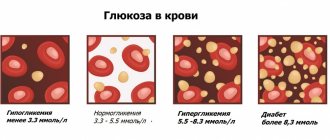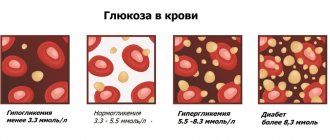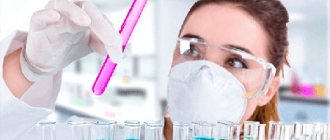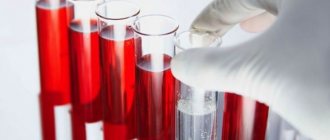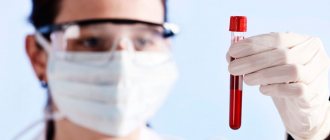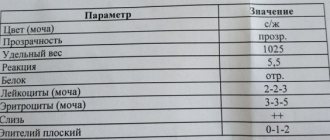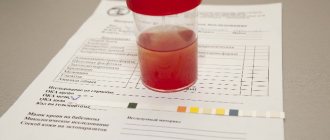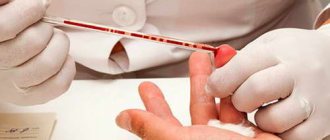Hypogonadism
Blackheads (acne)
Cervical cancer
11461 16 October
IMPORTANT!
The information in this section cannot be used for self-diagnosis and self-treatment.
In case of pain or other exacerbation of the disease, diagnostic tests should be prescribed only by the attending physician. To make a diagnosis and properly prescribe treatment, you should contact your doctor. We remind you that independent interpretation of the results is unacceptable; the information below is for reference only.
Testosterone: indications for use, rules for preparing for the test, interpretation of results and normal indicators.
Testosterone analysis: how to prepare
• Since physical activity stimulates the production of testosterone, you should avoid it the day before the test. This applies to intense sports and regular weight lifting. Smoking should also be avoided.
• For children and men, the test can be taken in the morning, on any day, for women - on the 6-7th day of the menstrual cycle (unless the attending physician has prescribed other dates for diagnostic purposes).
• The most favorable time to take blood for testing is from 8 to 11 am. A prerequisite is that blood is donated on an empty stomach, that is, after 8 and no more than 14 hours without food. You can only drink water.
References
- Dedov, I. I. Endocrinology: textbook / 2nd ed., revised. and additional - M.: GEOTAR-Media, 2013. - 432 p. — ISBN: 978-5-9704-2535-1.
- Kronberg, M. Reproductive endocrinology: textbook. - M.: GEOTAR-Media, 2011. - 416 p. — ISBN: 978-5-91713-029-3, 978-1-4160-2911-3.
- Tkachuk, V. A. Introduction to molecular endocrinology. Reception and intracellular signaling / ed. V. A. Tkachuk - M.: GEOTAR-Media, 2021. - 240 p. — ISBN 978-5-9704-4264-7.
- Khera, M. Testosterone Therapies, 2021. - Vol. 43(2). — P. 185-193. doi: 10.1016/j.ucl.2016.01.004.
Testosterone analysis explanation
Analysis for testosterone in men: the norm for men from 16 to 50 years old is 5.13 – 30.43 nmol/l. Testosterone levels in older men decrease and remain within the range of 5.4 – 19.5 nmol/l.
Testosterone analysis in women: the norm in women and girls from 13 years of age and throughout their reproductive years is between 0.36 and 1.97 nmol/l. During pregnancy, testosterone levels can be 3-4 times higher than normal. After menopause, the hormone level may decrease slightly and range from 0.28 to 1.22 nmol/l.
Testosterone analysis in children: the norm for boys in the first six months of life can vary from a minimum amount of 0.3 to a high concentration of 10.36 nmol/l. From 6 months to 9 years, testosterone levels usually remain stable below 1.24 nmol/L. For teenage boys, total testosterone is considered normal if it is below 15.41 nmol/L.
In girls under 13 years of age, testosterone levels usually do not exceed 0.98 nmol/l.
We must also remember that all people usually have hormone levels that fluctuate throughout the day: from the maximum value in the morning to the minimum in the evening.
All tests for testosterone should be interpreted by a doctor who takes into account not only the generally accepted average values of indicators, but also other factors that can affect the concentration of total testosterone in the blood.
What is testosterone and when is it necessary to donate blood to test hormone levels?
In men, testosterone is produced in the testes, in women - in the ovaries and adrenal cortex. Testosterone is responsible for the development of secondary sexual characteristics and the normal functioning of the reproductive system, protein synthesis and mood, as well as the growth of bones and muscles (in adolescence).
In the blood, testosterone is present in a free and protein-bound state. Only about 2% is free testosterone. 44% of testosterone in the human body is bound to globulin (SHBG), and 54% is bound to albumin or other proteins.
As a rule, to begin with, the doctor prescribes a test for total testosterone, and if a deviation from the norm is detected, he orders a test for SHBG.
Indications for testing for testosterone are:
- infertility;
- adrenal tumors;
- obesity;
- osteoporosis;
- acne;
- in men: erectile dysfunction, hypogonadism, decreased libido, chronic prostatitis, osteoporosis, Klinefelter syndrome;
- in women: menstrual irregularities, uterine bleeding, miscarriage, polycystic ovary syndrome, adrenogenital syndrome, ovarian tumors, endometriosis.
Preparing to donate blood
Typically, a referral for testosterone analysis is given by a gynecologist, andrologist, endocrinologist or reproductive specialist. In order for the testosterone level test results to be accurate, you need to prepare for the test in advance.
You cannot donate blood for testosterone within 24 hours after an ultrasound, fluorography or x-ray, as well as physiotherapeutic procedures and a rectal examination. Tell your doctor if you are taking any hormonal medications, including oral contraceptives and topical medications such as gels and ointments. If we are not talking about maintaining health and stopping the drug does not threaten serious problems, it is better to temporarily stop taking these medications. You can donate blood for testosterone 2 weeks after stopping taking hormonal medications.
The day before the test, it is recommended to refrain from any physical activity, drinking alcohol and smoking, as well as fatty foods. Blood testing for testosterone is done strictly on an empty stomach, in the morning (before 11 o’clock) - it is during this period that testosterone levels are highest.
Women should donate blood for testosterone around day 6-7 of the menstrual cycle.
Procedure for collecting biomaterial
To test for testosterone, blood is taken from a vein. Blood sampling is carried out by a qualified specialist in the laboratory. A disposable syringe is used for this. Usually the patient does not experience any discomfort, since the volume of blood required for this test is very small.
What causes increased testosterone?
• Adrenogenital syndrome provokes high testosterone in women;
• New growth of the testes increases testosterone in men;
• Disease or Itsenko-Cushing syndrome;
• A neoplasm in a woman’s ovaries, leading to the development of “masculinity” (deepening of the voice, a figure similar to a man’s, etc.);
• Decreased sex steroid binding globulin, or SHBG, in the blood;
• Excess and high intensity physical activity;
• The use of certain medications, such as levonorgestrel, mifepristone and various oral contraceptives, as well as tamoxifen, finasterine, danazol, phenytoin, etc.
Complexes with this research
Male hormones Assessment of hormonal levels in a man at any age RUR 6,180 Composition
Advanced anti-aging diagnostics in postmenopause Advanced monitoring of age-related changes during postmenopause RUR 29,230 Composition
Anti-aging diagnostics in postmenopause Control of age-related changes during postmenopause RUR 12,630 Composition
IN OTHER COMPLEXES
- Check-up No. 1 for children and teenagers RUB 10,950
- Male anti-aging diagnostics RUB 13,300
- Fitness control of sports nutrition RUB 5,140
- Preventative check-up RUB 11,960
- Advanced male anti-aging diagnostics RUB 33,710
Testosterone hormone in women - where does the danger lie?
Femininity does not mean that women should have no testosterone at all.
Everyone knows that excess testosterone in women causes masculinity, infertility, excess hair growth, as well as increased excitability and aggression. But low testosterone in women and men leads to decreased libido, physical weakness, hair loss, excess body weight, osteoporosis, atrophic changes in the skin, decreased mood, and even depression. Therefore, both high and low testosterone pose a danger to women’s health.
Having learned from your doctor about testosterone, how to increase its level, you can use simple methods that are available to everyone and approved by modern medicine.
Testosterone in men: normal and abnormalities
Male sex hormones play an important role in the normal functioning of the body:
- stimulate the development of the genital organs (penis, epididymis, seminal vesicles, prostate gland);
- form physical, mental and behavioral characteristics according to the male type (masculinity);
- regulate spermatogenesis;
- stimulate sexual expression.
The amount of this hormone in the body determines its external masculine characteristics that are distinctive from women: broad shoulders, narrow hips, sexual orientation, the possibility of having offspring, active metabolism, and so on.
Reduced testosterone levels in men
A decrease in the level of this hormone is medically called hypogonadism. There are:
- primary hypogonadism - the production of the hormone by the testicles is impaired;
- secondary hypogonadism - reduced production of hormones by the pituitary gland, which stimulate the synthesis of testosterone in the testicles.
Causes of hypogonadism
- Psychological. Thus, adrenaline, which is released in a state of stress, suppresses the production of the hormone.
- Excessive consumption of certain drinks (fizzy drinks, vegetable oils, full-fat milk, alcohol) and foods (salt, sugar, caffeine, soy, fast food, foods with high cholesterol).
- Side effects from certain medications or medical interventions.
— Injuries to the male genital organs.
- Inactive lifestyle.
- Age. In men after 30 years of age, a decrease in hormone levels by 1–2% is observed.
What diseases lead to decreased testosterone production?
- Chronic obstructive pulmonary disease, as well as bronchial asthma.
- Arterial hypertension.
- Cardiac ischemia.
- Obesity.
- Diabetes.
- Liver cirrhosis and chronic alcoholism.
- Atherosclerosis.
Signs of low testosterone levels in the male body:
- absence or insufficient amount of hair on the chest and face;
- fat deposits;
- weakening of muscle tone;
- breast growth (gynecomastia);
- periodic causeless redness of the face and chest, feeling of heat;
- increased sweating;
- dyspnea;
- decreased libido and potency;
- deterioration of mental abilities.
Men who have low levels of this hormone rarely go bald.
Since the hormone testosterone is a male sex hormone, if you identify several of the listed signs in yourself, contact an endocrinologist. Do not self-medicate under any circumstances!
Low testosterone - consequences for men:
- development of osteoporosis - thinning of bone tissue;
- psychological instability - anxiety, frequent mood swings, and sometimes lack of interest in life;
- serious sexual dysfunction;
- absent-mindedness and forgetfulness;
- sleep disturbance;
- the likelihood of developing diabetes mellitus;
- risk of stroke and heart attack.
How to increase testosterone in men?
It will not be possible to win the battle with age-related decrease in the male sex hormone. But it is possible and even necessary to raise the low level to normal levels.
There are many answers to the question of how to increase hormone levels. First of all, doctors recommend paying attention to proper nutrition. The increase is beneficially affected by a varied diet rich in vitamins and minerals (in particular zinc).
Following a healthy lifestyle can improve low testosterone levels in men.
How to increase hormone levels without medications?
Get adequate sleep: When you sleep, the endocrine system increases the amount of melatonin, growth hormone and testosterone. Increased production of the latter is evidenced by an involuntary erection shortly before waking up.
Is it possible to increase low hormone levels in men with medications?
Can. If you have low testosterone levels, don't worry! Timely treatment will eliminate the problem.
Modern medicine knows how to increase testosterone . Low hormone levels are treated with:
- intramuscular injections;
- testosterone patch (worn on the body or directly on the scrotum);
- testosterone gel;
- mucoadhesive preparations (placed over the upper teeth twice a day);
- oral medications.
Drug increase of the hormone allows you to normalize the level of male sex hormone.
Each of these treatments provides the required level of hormone replacement therapy.
However, each of them has its own advantages and disadvantages. Talk to your doctor about how to increase your hormone levels.
Testosterone treatment is contraindicated in patients with prostate cancer. Before treatment, get a cancer screening, rectal examination, and prostate-specific antigen test.
Elevated testosterone levels in men
The more, the better, or How to increase testosterone for a healthy man?
Some men are looking for ways to increase their hormone levels, mistakenly believing that this will give them courage and strength. You can find many suggestions on the Internet on how to raise your hormone levels using magic pills and powders. Be careful: the male hormone above the norm provokes negative consequences! Consult your physician before use.
Too high levels of this hormone disrupt the structure of cell membranes, activate killer proteins and cause DNA fragmentation.
Too high testosterone: external signs
- attacks of aggression;
- increased excitability;
- increased hairiness;
- purulent acne.
A man whose testosterone production is greatly increased is prone to suicide.
Increased testosterone in men can cause testicular atrophy. The fact is that the body, trying to independently balance the amount of male sex hormone, neutralizes the effect of the male gonads. Over time, this can lead to decreased testicular function.
A hormone that appears in the body artificially (for example, one that is used to build muscle mass) negatively affects the body’s independent production of male hormone.
Increased levels of male testosterone in boys are observed during premature puberty.
How to lower testosterone in men?
First of all, consult your doctor. Self-medication can aggravate the condition and lead to irreversible processes.
You can switch to a low-carb diet with limited fat. Vegetables and not too sweet fruits have a positive effect on reducing testosterone.
Regular physical activity and walks in the fresh air will also help normalize the amount of the hormone in the body.
Testosterone analysis in men
The test should be taken by men who have the following problems:
- decreased libido;
- violation of potency;
- chronic prostatitis;
- primary and secondary hypogonadism;
- osteoporosis;
- excessive physical activity.
Having passed the test and identified deviations from the norm, the doctor will prescribe an individual course of treatment for you. Only your doctor will tell you how to increase the level of the hormone or decrease its amount, based on your test results.
Testosterone in men: normal - 10–40 nmol/l.
Lifetime hormone levels:
Hormone levels throughout the day
Rules for preparing for sperm culture and spermogram
For culture, sperm can be collected at home. It is first necessary to carry out thorough hygiene of the external genitalia. Sperm is collected only after urination and in the morning. The material is collected in a container, which must be tightly closed immediately after collection. It is important that at least 5 days have passed since the last sexual intercourse. You cannot visit baths and saunas for 7 days.
For a spermogram, sperm obtained through masturbation is donated. Moreover, it is necessary to submit the material in the laboratory, since some indicators must be assessed in the first 30 minutes. Before the study, it is important to limit intimacy for at least 2, but no more than 5 days. For a week you need to eliminate going to the sauna and bathhouse and even heating the car seat, and for a week you need to give up smoking and alcohol.
Make an appointment with a urologist and do the necessary tests
To find out what tests are needed in your case, make an appointment with a qualified urologist.
The State Urology Center conducts all the necessary urological examinations, which you can undergo under the compulsory medical insurance policy. All tests can be done on days convenient for you and in the shortest possible time, which will allow you to quickly obtain the results the urologist needs to make a diagnosis. January 20, 2021
Hakobyan Gagik Nersesovich - urologist, oncologist, MD, doctor of the highest category, professor of the Department of Urology of the Federal State Autonomous Educational Institution of Higher Education First Moscow State Medical University named after. THEM. Sechenov
All publications...
What affects the level
Hormones are a subtle instrument of the body that sensitively responds to external and internal causes. There is no better way to detect a problem than to have a man testosterone tested. A decrease from normal levels occurs due to:
- Constant stress, nervous overload. In such conditions, a natural enemy of the male androgen, cortisol, is produced, which changes it to the female version (estrogen).
- Poor nutrition. A large number of smoked products, pickles, fast food, carbonated sweet drinks, store-bought juices, confectionery, baked goods, and bread disrupt the body’s metabolic processes. These products contain a lot of salt, spices, sugar, and simple carbohydrates. They are quickly broken down without requiring energy expenditure and are easily stored in the form of strategic fat reserves. Its cells, in turn, “process” testosterone into female estrogen. A decrease in steroids provokes dangerous abdominal (internal) obesity. The circle closes.
- Insufficient activity. Under the influence of power loads, steroid structures are intensively produced in the body. This is best facilitated by working with weights: physical labor, strength exercises, including bodyweight exercises (push-ups, pull-ups).
- Drinking alcohol, drugs, smoking. Any of these habits is detrimental not only to potency, but also to the entire body. If it is absolutely impossible to give up alcohol, then it is better to choose natural, high-quality red wine. Cognac and beer contain plant analogues of female sex hormones that have a detrimental effect on potency.
- Immunity. Reduced by the environment, lifestyle, and acts of infection, the body’s protective reserves suppress the brain, testes, adrenal glands, and hormonal levels.
- The presence of chronic diseases, the consequences of previous illnesses (even in childhood).
- Pathological processes in the heart, blood vessels, nervous system, thyroid gland, lungs, joints can cause a decrease in the hormone.
- Taking medications and sports supplements.
Any of these factors, and even more so their combination, has a negative impact on the human body. It is advisable to promptly review your lifestyle and adjust it in a positive direction before the doctor forces you to do so.
